Jashn-e-Rivaj or Deepawali
To save themselves from embarrassment, Liberals should leave their lies in the past. They should accept the truth that Urdu is of Indian origin.
Total Views |
Until the late 19th century, when Afghanistan and Pakistan were yet to be born, India and Persia were neighbours. So when the Persians were persecuted in their country, they came to their neighbour, India for refuge. When the Mughal Humayun had to flee India he sought shelter next door, in Persia.
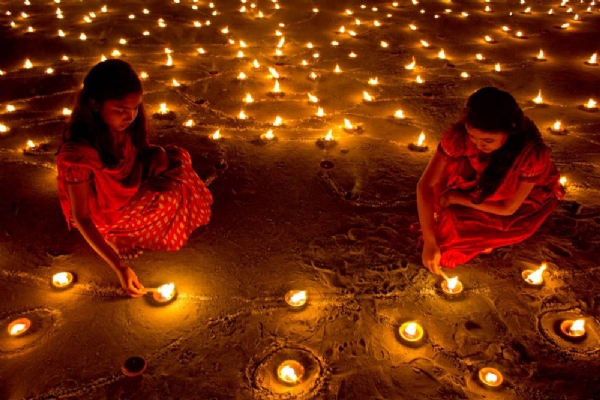
The two countries shared a lot more than a common border. They shared a similar language and a similar culture. The languages of the ancient lands of India and Persia (Iran) were Vedic Sanskrit and Avestan respectively. These sister languages shared common words with same meanings and many common traditions like the worship of Sun and Fire. Here are some corresponding words in the two languages. This small subset is to show how similar the words in Sanskrit and Avestan sound.
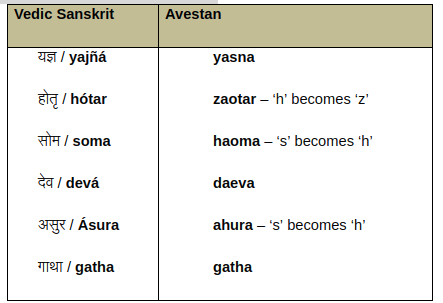
While here are the words for the numbers one to ten in the languages of India and Persia –
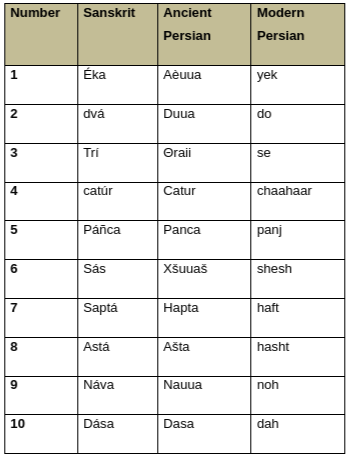
Juban-e-Urdu
When the Arabs invaded Persia in 7th century, and imbibed the Parsi language. They pronounced it as ‘Farsi’. In the 15th century, the Mongolians (aka Mughals) came from Central Asia to India via Persia. With them they brought Farsi language that was studded with Arabic words. By the early 18th century, a new language Zuban-e-Urdu had evolved. This language was a mixture of words from Hindi, Farsi and Arabic. Urdu uses the same grammar and structure of Hindi. Without its own grammar Urdu is an incomplete language.
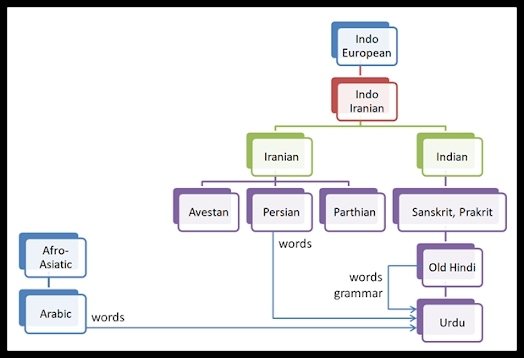
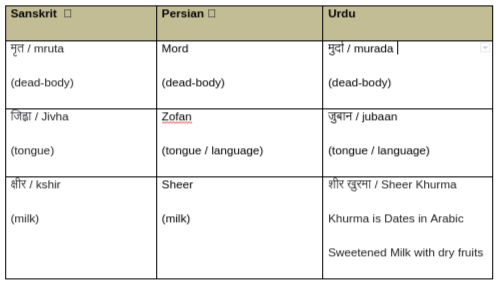
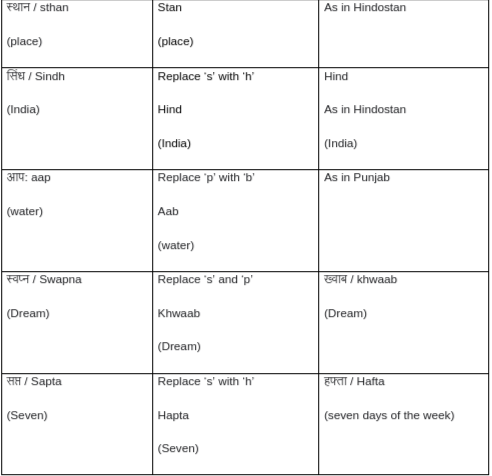 \
\Jashna
Another Sanskrit word that came back to India with the Mughals was – Jashna. The Sanskrit word यज्ञ (Yajna) became Yasna in ancient language of Persia. In the modern Persian language Yasna became Jashn. The sounds य Ya / ज Ja are interchangeable as in – यमुना (Yamuna) / जमुना (Jamuna) or यशोदा (Yashoda) / जशोदा (Jashoda). So Yasna became – Jashna. This word was borrowed from Farsi by Urdu. Thus we see –
यज्ञ Yajna (Sanskrit) –> Yasna (Farsi) –> जशन Jashna (Urdu)
The Sanskrit, Yajna means a sacrificial ceremony. The ancient Persian Yasna was also a sacrifice, a fire worship. Later it came to mean a ceremony or a festival. While the Urdu word Jashna means celebration.
Jashna-e-Chiraag
Last year, Shashi Tharoor took to Twitter to wish people on occasion of ‘Jashn-e-Chiraag’ instead of the usual ‘Shubha Deepawali’ greeting. Let us see the exact meaning of this phrase.
Chirag is another Persian word in Urdu that means lamp or diya or deepa. Thus the Urdu ‘Jashna-e-Chiraag’ means ‘Celebration of Light’. The same phrase in old Persian would mean – ‘Yasna of Chiraag’. While its Sanskrit core means – The Yajna of Deepa or दीप यज्ञ (Deepa Yajna).
Jashna-e-Rivaj
Recenlty, FabIndia used a phrase – Jashna-e-Rivaj instead of ‘Deepawali’. This Urdu expression has an Arabic word – Rivaaj, which means traditions or customs.
रवाज ravaaj (Arabic) –> रवाज ravaaj (Farsi) –> रिवाज rivaaj (Urdu)
The Urdu word रिवाज joined hands with Hindi word of same meaning रीति to become ‘रीति-रिवाज’. At a first glance ‘Jashan-e-Rivaj’ seems to be – some ‘Traditional Arabic Celebration’. On scratching the surface it turns out to be a ‘Traditional Persian Sacrifice’. But deep down it means – The Traditional Yajna or रीति यज्ञ (Reeti Yajna).
Deepawali
The Sanskrit meaning of word Deepawali, from Apte Dictionary is –
दीपावली = दीप (diya, lamp) + आवली (row, line, array) = row of lights
दिवाली = दिवा (lamp, light, diya) + आलि (row, line, array) = row of lights
The festival in which rows of lamps are lighted is simply called Diwali / Deepawali.
उर्दू दीवानापन / Craze for Urdu
Though Urdu has a Farsi Mousi, Urdu is the child of Mother India. Pakistan when it separated from India, wanting to establish its own new identity adopted Urdu over Sindhi and Punjabi as its national language. Ironically it turned out that Urdu is as Indian as Sindhi and Punjabi are.
In India, many liberals, like the Pakistanis leaders, mistakenly believe that Urdu is ‘not Hindu’. Then they do the second mistake of trying to ‘secularize’ Hindu greetings by giving it a coat of Urdu. This is a grave insult to the Indian Heritage, to the Indian Hindus, to the Indian Muslims and to say the least to secularism. Because –
- One, they project Urdu as the language of the ‘Royal Mughals’, and not as the language of India. They keep harping on its Arabic and Persian inheritance while completely hiding its Indian ancestry. Making it seem exotic and glamorous.
- They glorify Urdu as the sweetest language but hide that it does not have its own grammar. They hide the fact that Urdu needs the support of the Hindi Grammar, without which it is not even a language.
- Urdu speakers, mainly the Indian Muslim community incorrectly associates its Muslim identity with the so called ‘foreign’ and ‘royal’ language. Instilling in them a feeling of false superiority.
- Many a poets of India, mainly from the Hindi speaking belt, incorrectly give more importance to Urdu than to their mother tongue. They superstitiously believe that writing poetry in Urdu is better and more beautiful than their own mother tongue.
- By coating Hindu customs with Urdu phrases, they alienate Indian Muslims from Indian languages. The Indian Muslims too are speakers and inheritors of other Indian languages.
- By coating Hindu customs with Urdu phrases, they hurt the sentiments of Indian Hindus. They not only insult their mother tongues but also quite openly try to wipe out their cultural identity.
- By downplaying Hindu customs, they are not being secular. This action hurts the secular fabric of India.
- Even after committing the above seven sins, they cannot wipe out the Sanskrit and Hindu roots of Jubaan-e-Urdu.
Even after committing the above seven sins, they cannot wipe out the Sanskrit and Hindu roots of Jubaan-e-Urdu. It still means The Urdu Jihva (उर्दू जिह्वा). Jashna-e-Chiraag still means दीपयज्ञ. And Jashna-e-Rivaj still means – रीतियज्ञ.
Conclusion
To save themselves from embarrassment, Liberals should leave their lies in the past. They should accept the truth that Urdu is of Indian origin. They should give equal importance to all Indian languages. They should value the Indian रीति रिवाज and give Diwali wishes in the Hindu way, by wishing शुभ दीपावली (Shubha Deepawali). Of course, if they want, they can also wish - शुभ दीपयज्ञ (Shubha Deep Yajna) / शुभ रीतियज्ञ (Shubha Traditional Yajna).
References-
All word roots from – https://en.wiktionary.org/
The Language Family Tree from - https://en.wikipedia.org/wiki/Indo-European_languages
Practical Sanskrit-English Dictionary – V. S. Apte
